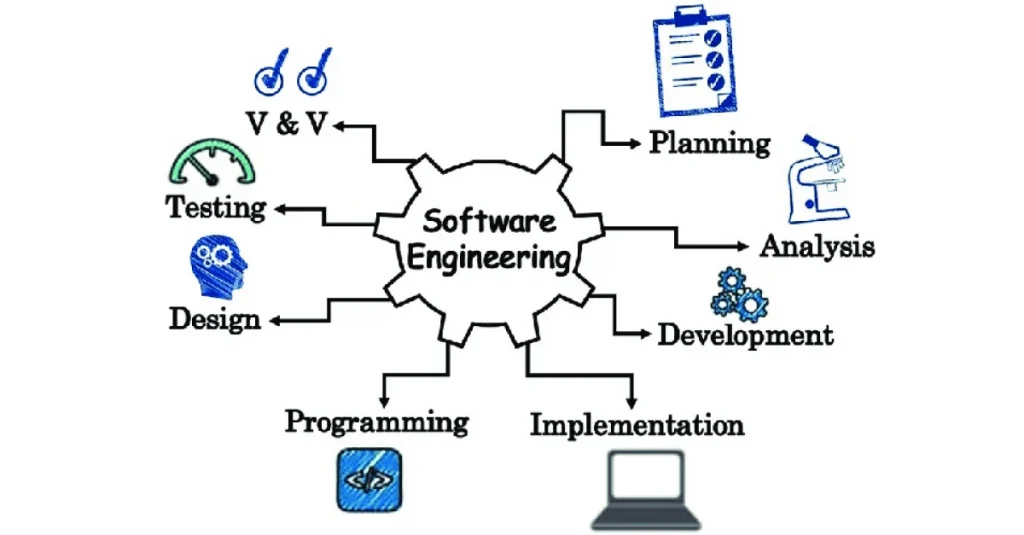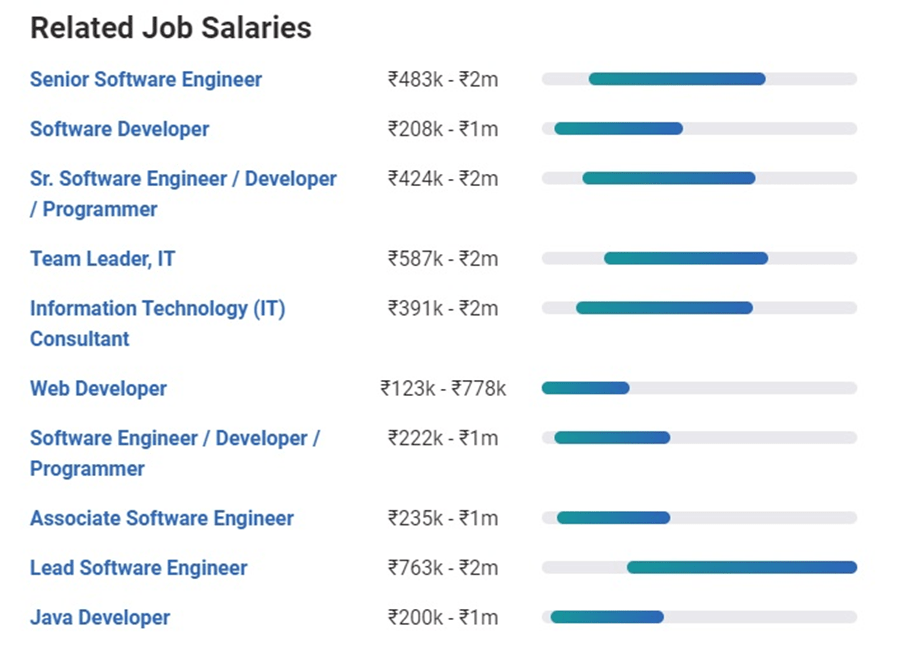
- Role of a Software Engineer
- Average Salary Overview
- Salary by Location
- Salary by Experience
- Salary by Industry
- Specialized Roles and Salaries
- Freelancing vs Employment
- Perks and Benefits
- Salary Trends Over Years
- Negotiation Tips
- Global Comparison
- Career Growth Potential
- Conclusion
Role of a Software Engineer
A Software Engineer is a professional who designs, develops, tests, and maintains software applications or systems. This role involves applying engineering principles to software creation, ensuring solutions are efficient, reliable, and scalable. Software engineer salary per month helps professionals evaluate compensation expectations across roles and regions, especially as demand for skilled engineers continues to rise. Software engineers collaborate with cross-functional teams including product managers, designers, and other engineers to translate user needs into functional software.
- Writing clean, efficient, and maintainable code.
- Debugging and troubleshooting software issues.
- Designing software architecture and system components.
- Collaborating in Agile or DevOps environments.
- Conducting code reviews and ensuring best practices.
- Staying updated with emerging technologies and trends.
Understanding software developer salary trends is essential for professionals navigating these responsibilities, as compensation often reflects the complexity and impact of their work. Software engineering encompasses many subfields such as front-end, back-end, full-stack development, mobile development, embedded systems, and more. Factors like specialization, experience, and geographic location play a major role in determining software developer salary across these domains.
Would You Like to Know More About Web Developer? Sign Up For Our Web Developer Courses Now!
Average Salary Overview
The salary of software engineers varies widely depending on various factors like experience, location, industry, and skill set. Software engineer salary per month helps professionals gauge realistic earnings and compare opportunities across regions and roles. However, on average, software engineers earn competitive compensation due to high demand and specialized skills.

- Entry-Level: Fresh graduates or those with less than 2 years of experience generally earn between $60,000 to $90,000 per year in the US.
- Mid-Level: Engineers with 3-7 years of experience typically see salaries ranging from $90,000 to $130,000.
- Senior-Level: Seasoned professionals with over 7 years can earn between $130,000 and $180,000, or even more, especially in high-paying tech hubs.
Software engineer salary per month is just one part of the equation. Total compensation often includes bonuses, stock options, and benefits, which can significantly increase the overall package.
Salary by Location
Salary by Location is one of the biggest factors affecting software engineer salaries. Salaries tend to be higher in regions with a high cost of living or significant tech industry presence.
- San Francisco Bay Area (Silicon Valley): Among the highest salaries worldwide, often exceeding $150,000 – $200,000 for experienced engineers.
- Seattle: Home to giants like Amazon and Microsoft, salaries range $120,000 – $180,000.
- New York City: Strong tech and finance sectors offer salaries between $110,000 – $160,000.
- Austin, TX: Growing tech hub with salaries in the range of $90,000 – $140,000.
- Other Cities: Smaller cities or less tech-focused areas generally offer lower pay, sometimes 20-30% less than the top hubs.
- London: Average software engineer salary is around £45,000 – £75,000 (~$55,000 – $90,000).
- Berlin: Growing tech scene with salaries between €45,000 – €70,000 (~$48,000 – $75,000).
- Paris: Average salaries around €40,000 – €65,000.
- Eastern European countries typically have lower salaries but growing opportunities.
- India: Entry-level salaries often range from ₹300,000 to ₹800,000 ($4,000 to $10,000), with senior roles up to ₹2,000,000 ($27,000).
- China: Salaries vary widely but can reach ¥200,000 – ¥400,000 (~$30,000 – $60,000).
- Japan and South Korea: Competitive salaries, often between $40,000 – $80,000.
- Internships/Co-ops: Usually stipend-based, ranging from a few hundred to a few thousand dollars per month.
- Junior Software Engineer (0-2 years): Salary reflects learning curve and basic contribution, generally $60,000-$90,000 in the US.
- Mid-Level Engineer (3-7 years): Expected to independently design features and solve complex problems, salaries rise accordingly.
- Senior Engineer (7+ years): Often leading teams, architecting systems, and mentoring juniors, commanding premium pay.
- Lead/Principal Engineer or Architect: Strategic roles that can earn well over $180,000-$220,000.
- Tech Companies: Software giants like Google, Apple, Microsoft, and Amazon typically offer the highest salaries plus stock options.
- Finance and Fintech: High demand for engineers in banks and fintech firms leads to lucrative pay packages.
- Healthcare: Growing tech adoption in health tech offers competitive pay but usually less than tech giants.
- Startups:Software developer salary at startups can be lower, but stock equity and growth potential are appealing.
- Government and Nonprofits: Generally offer lower salaries but may provide job stability and benefits.
- Front-End Developer: Focuses on user interfaces; average salary $80,000 to $130,000.
- Back-End Developer: Works on servers, databases, APIs; often earns $90,000 to $140,000.
- Full Stack Developer: Combines front and back end skills; salary ranges from $90,000 to $150,000.
- DevOps Engineer: Manages infrastructure, automation; typically earns $100,000 to $160,000.
- Data Engineer/ML Engineer: Works with big data and machine learning; salaries often exceed $120,000.
- Security Engineer: Specialized in protecting systems; can earn $110,000 to $170,000.
- Mobile Developer: Focuses on iOS/Android apps; generally $80,000 to $130,000.
- Freelancers set their rates, which can vary greatly.
- Hourly rates typically range from $40 to $150+ depending on skill and demand.
- Pros: Flexibility, varied projects, potentially higher income.
- Cons: Income inconsistency, lack of benefits, self-employment taxes.
- Offers steady income, benefits (healthcare, retirement), paid leave.
- May have less flexibility compared to freelancing.
- Often includes bonuses and stock options.
- Health Insurance: Medical, dental, and vision coverage.
- Retirement Plans: 401(k) matching or pensions.
- Paid Time Off: Vacation, sick leave, parental leave.
- Stock Options/Equity: Common in startups and tech giants.
- Bonuses: Performance or signing bonuses.
- Learning Opportunities: Sponsored training, conferences.
- Remote Work Flexibility: Increasingly common and valued.
- Wellness Programs: Gym memberships, mental health support.
- Increased reliance on software in all sectors.
- Growth in demand for specialized skills (AI, cloud computing).
- Geographic shifts with remote work opening new markets.
- Inflation and cost of living adjustments.
- higher salaries in cloud computing and machine learning roles.
- More companies offering remote positions with location-adjusted salaries.
- Increased equity grants as startups compete for talent.
- Rise in contract and freelance roles offering premium hourly pay.
- Research: Know the market rate for your role and location using platforms like Glassdoor, Levels.fyi, or Payscale.
- Highlight Value: Emphasize your skills, experience, and accomplishments.
- Consider Total Compensation: Don’t just negotiate base salary; discuss bonuses, stock options, benefits, and work flexibility.
- Practice: Role-play negotiation conversations.
- Be Professional: Express enthusiasm and willingness to find a win-win agreement.
- Be Ready to Walk Away: If the offer doesn’t meet your minimum expectations, consider other opportunities.
- Junior Engineer: Learning and contributing to small projects.
- Mid-Level Engineer: Handling larger tasks and projects independently.
- Senior Engineer: Leading technical efforts, mentoring juniors.
- Tech Lead/Engineering Manager: Managing teams and projects.
- Principal Engineer/Architect: Shaping product architecture.
- Director/VP of Engineering: Leading multiple teams or departments.
United States
Europe
Asia
Interested in Obtaining Your Web Developer Certificate? View The Web Developer Courses Offered By ACTE Right Now!
Salary by Experience
Experience significantly impacts salary:
Salary by Industry
Software engineer salary per month can vary across different industries depending on demand, profitability, and the value placed on technical expertise.
Specialized Roles and Salaries
Software engineering has multiple specialties that affect earning potential.

To Explore Web Developer in Depth, Check Out Our Comprehensive Web Developer Courses To Gain Insights From Our Experts!
Freelancing vs Employment
Freelance Software Engineer
Full-Time Employment
Some software engineers balance both by freelancing on the side or transitioning to consultancy roles later in their careers.
Perks and Benefits
Salaries are just part of the compensation. Perks and benefits enhance overall package
These benefits can add significant value beyond the base salary.
Salary Trends Over Years
Software engineer salaries have generally trended upwards due to:
Recent trends include:
Negotiation Tips
Negotiating salary can be intimidating but is crucial to maximizing your earning potential.
Typical career path:
Global Comparison
Salaries differ significantly worldwide due to economic conditions, cost of living, and demand.
| Country | Average Software Engineer Salary (USD Equivalent) |
|---|---|
| United States | $100,000 – $150,000+ |
| Canada | $70,000 – $110,000 |
| United Kingdom | $50,000 – $90,000 |
| Germany | $55,000 – $95,000 |
| Australia | $70,000 – $120,000 |
| India | $5,000 – $15,000 |
The global tech market is becoming more interconnected, with remote work enabling engineers in lower-cost countries to earn more by working for foreign firms.
Career Growth Potential
Software engineering offers excellent career growth and salary advancement opportunities.
Typical career path:
With each step, salary potential increases significantly. Specializing in high-demand skills like AI, cybersecurity, or cloud computing can further boost earnings.
Conclusion
The salary of a software engineer is influenced by multiple factors, including role, experience, location, industry, and specialization. While base pay is important, total compensation, including benefits and growth opportunities, should be considered. Software developer salary trends across regions and roles helps professionals evaluate their worth and plan career moves strategically. With the continued expansion of the tech industry globally, software engineering remains one of the most lucrative and dynamic career paths available. Whether you are an aspiring software engineer or looking to advance your career, understanding salary benchmarks and negotiation strategies empowers you to make informed decisions and maximize your earnings.





